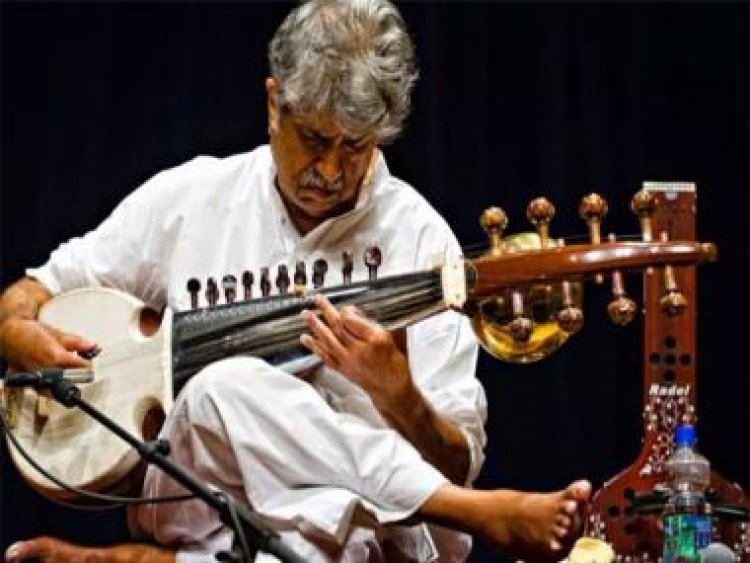Pandit Rajeev Taranath: The maestro in his multiple worlds
Pandit Rajeev Taranath: The maestro in his multiple worlds

I listen wide-eyed to stories of his legendary father Pandit Taranath, mother Sumathi Bai who was a brilliant orator and writer in English in that early 1920s era, of amazing vignettes of childhood in the Premayatana Ashram on the banks of Tungabhadra river, and of the famous and fascinating people visiting there. A child growing up in the 40s, he imbibed the ferment of freedom, reform, idealism, and an openness to the new Western knowledges seeping into the Indian society. His parents inculcated the passion for literature and music in their young son. The maestro has vivid memories of great musicians like Pt Bhimsen Joshi, Pt Basavraj Rajguru and others visiting his home in Bangalore, and the saint-singer Panchakshari Gawai teaching him. Famous literati of the time like Raja Rao, his French wife Camille, Kannada writers Kailasam, and A N Krishna Raocame to the Ashram. Pandit Taranath taught him tabla when he could hardly tell his left hand from the right. So, to this day, the internationally acclaimed sarod maestro, Pt Rajeev Taranath is left-handed only when he plays the tabla!
Rajeev ji often quips, “My life story makes very nice copy, but living it was a different matter.” At twenty, when he set off on a single-minded pursuit of music, little did he know of the hardships he would face in his student days in Calcutta and Bombay? Penury, sickness, moments of despair, jobs he took up to survive (including in a school with the actor Utpal Dutt for colleague!)—all these were compensated by the rare privilege of learning from the “trinity”—Ustad Ali Akbar Khan, Pt Ravishankar, and Smt Annapoorna Devi.
In the early 60s, just as Rajeev ji found his moorings in sarod music, Prof C D Narasimhiah invited him to do a masters in English at the Mysore University. A brilliant academic career, series of professorships across India, path-breaking work on English and Indian English writers, and accolades like being the first Indian to be referenced in the famous Arden edition of Shakespeare followed. He was among those who birthed the Kannada modernist movement. Besides, he set a new trend in film music with Avant Garde, award-winning Malayalam and Kannada films like Kanchanaseetha, Pokkuveyil, Samskara, Pallavi and others.
Through these years, Rajeev ji continued to give concerts all over India. This globe-trotter has performed extensively in the US and UK. He happens to be the first Indian to perform at the Sydney Opera House in Australia. Among the several major awards he received are the Sangeet Natak Akademi award, the Padmashree, and Karnataka government’s Chowdiah award.
Here are some snippets of my recent conversation with Rajeev Ji.
Q. Your father Pandit Taranath was something of a renaissance man—a doctor, musician, cultural thinker, and social reformer. Like him, you too are multi-talented. Yetmusic becamean all-consuming passion in your life. How did that happen?
RT: My father taught me first. Then came many teachers–Shankargowda Patil, Savanur Krishnachar, and Venkatrao Ramdurgkar, a senior disciple of Sawai Gandharva, and Shankar Joshi who arrived on the day my father died! I gave my first vocal music performance at ten. In the early teens, my voice broke. I took to singing film songs of Talat Mehmood, Saigal and others (I met Talatsaab much later. He asked me to do playback singing. But I was already playing sarod. So, I could not accept the offer).
As a young man, I was a topper in college and had many academic ambitions. Then, Ustad Ali Akbar Khan saab came with Pt Ravishankar ji to Bangalore. The impact of that concert washed away everything. A single desire burned within, to go to this great man. After some time, Chetan Anand (actor Dev Anand’s brother) introduced me to Khansaab. In December 1955, I resigned my lecturer job in Bangalore and went to Khansaab. He opened the door, laughed, and invited, “Madman, come in!”
Q: You have often declared that you moved away from literature. Perhaps, this happened around the time you resigned your job as English professor at the Central Institute of Foreign Languages (EFLU now). Pt Ravishankar pushed you into full-time music then. Talk about these life choices….
RT: In literature, I function as a reader, perhaps a sensitive and experienced one. But in music, I have to be creative. Every musician is a creator and also interpreter when he plays a raga. A part of my critical awareness, my attitudes, acceptances might have come from literature. All this also functions in music as I double up as listener and performer.
For Rajeevji, teaching is a crucial part of life. He researched on the Maihar-Allauddin gharana for the Ford Foundation in the 80s and taught at the prestigious Calarts (California Institute of Arts, LA). He continues to train students globally. Besides, he has established the Pandit Taranath Foundation to provide a platform for senior, as well as upcoming, musicians.
Pt Rajeev Taranath turned ninety last month. Recently, along with the well-known director of the Malayalam Cinema Adoor Gopalakrishnan, he received the Swaralaya award from Kerala. It is time indeed to celebrate the man, his music, and his literary excellence!
Read all the Latest News, Trending News, Cricket News, Bollywood News, India News and Entertainment News here. Follow us on Facebook, Twitter and Instagram.
What's Your Reaction?



























































